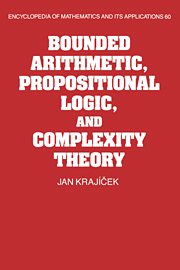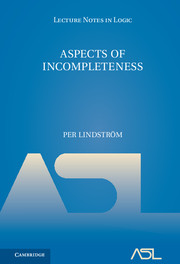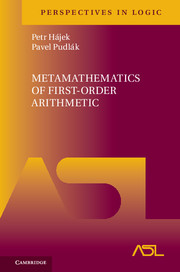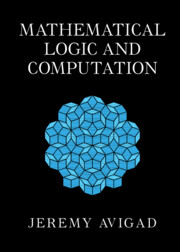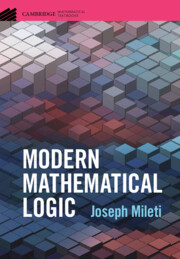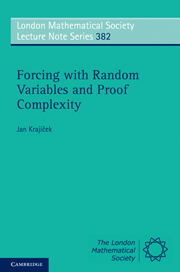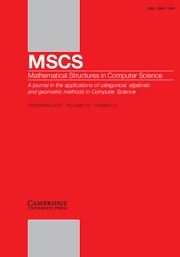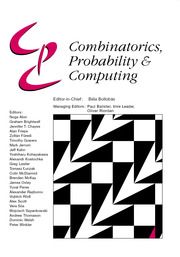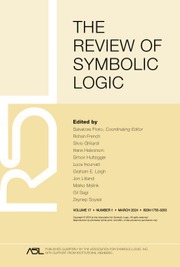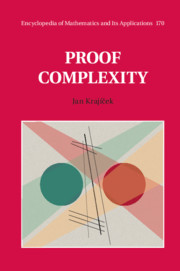Bounded Arithmetic, Propositional Logic and Complexity Theory
$151.00 USD
Part of Encyclopedia of Mathematics and its Applications
- Author: Jan Krajicek, Charles University, Prague
- Date Published: February 2011
- availability: This ISBN is for an eBook version which is distributed on our behalf by a third party.
- format: Adobe eBook Reader
- isbn: 9780511884283
Find out more about Cambridge eBooks
$
151.00 USD
Adobe eBook Reader
Other available formats:
Hardback
Looking for an inspection copy?
This title is not currently available on inspection
-
This book presents an up-to-date, unified treatment of research in bounded arithmetic and complexity of propositional logic, with emphasis on independence proofs and lower bound proofs. The author discusses the deep connections between logic and complexity theory and lists a number of intriguing open problems. An introduction to the basics of logic and complexity theory is followed by discussion of important results in propositional proof systems and systems of bounded arithmetic. More advanced topics are then treated, including polynomial simulations and conservativity results, various witnessing theorems, the translation of bounded formulas (and their proofs) into propositional ones, the method of random partial restrictions and its applications, direct independence proofs, complete systems of partial relations, lower bounds to the size of constant-depth propositional proofs, the method of Boolean valuations, the issue of hard tautologies and optimal proof systems, combinatorics and complexity theory within bounded arithmetic, and relations to complexity issues of predicate calculus. Students and researchers in mathematical logic and complexity theory will find this comprehensive treatment an excellent guide to this expanding interdisciplinary area.
Read more- Comprehensive treatment of an expanding subject
- Emphasis is given to independence proofs and lower bound proofs
- Completely up-to-date survey
Reviews & endorsements
'This interesting book provides a brisk account of current research in bounded arithmetic and the complexity of propositional logic.' Mathematika
See more reviews'It can be strongly recommended especially to mathematicians and computer scientists working in the field and to graduate students.' European Mathematical Society Newsletter
Customer reviews
Not yet reviewed
Be the first to review
Review was not posted due to profanity
×Product details
- Date Published: February 2011
- format: Adobe eBook Reader
- isbn: 9780511884283
- availability: This ISBN is for an eBook version which is distributed on our behalf by a third party.
Table of Contents
1. Introduction
2. Preliminaries
3. Basic complexity theory
4. Basic propositional logic
5. Basic bounded arithmetic
6. Definability of computations
7. Witnessing theorems
8. Definability and witnessing in second order theories
9. Translations of arithmetic formulas
10. Finite axiomatizability problem
11. Direct independence proofs
12. Bounds for constant-depth Frege systems
13. Bounds for Frege and extended Frege systems
14. Hard tautologies and optimal proof systems
15. Strength of bounded arithmetic
References
Index.-
General Resources
Find resources associated with this title
Type Name Unlocked * Format Size Showing of
This title is supported by one or more locked resources. Access to locked resources is granted exclusively by Cambridge University Press to lecturers whose faculty status has been verified. To gain access to locked resources, lecturers should sign in to or register for a Cambridge user account.
Please use locked resources responsibly and exercise your professional discretion when choosing how you share these materials with your students. Other lecturers may wish to use locked resources for assessment purposes and their usefulness is undermined when the source files (for example, solution manuals or test banks) are shared online or via social networks.
Supplementary resources are subject to copyright. Lecturers are permitted to view, print or download these resources for use in their teaching, but may not change them or use them for commercial gain.
If you are having problems accessing these resources please contact [email protected].
Sorry, this resource is locked
Please register or sign in to request access. If you are having problems accessing these resources please email [email protected]
Register Sign in» Proceed
You are now leaving the Cambridge University Press website. Your eBook purchase and download will be completed by our partner www.ebooks.com. Please see the permission section of the www.ebooks.com catalogue page for details of the print & copy limits on our eBooks.
Continue ×Are you sure you want to delete your account?
This cannot be undone.
Thank you for your feedback which will help us improve our service.
If you requested a response, we will make sure to get back to you shortly.
×
